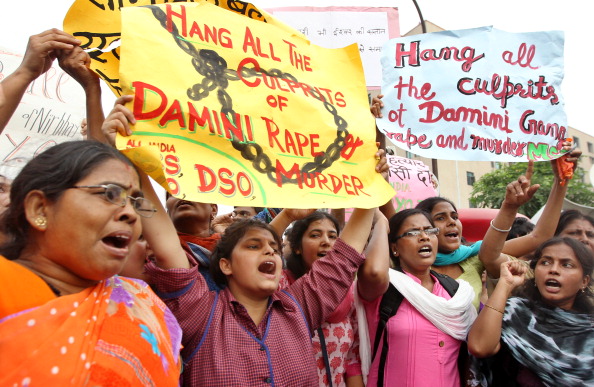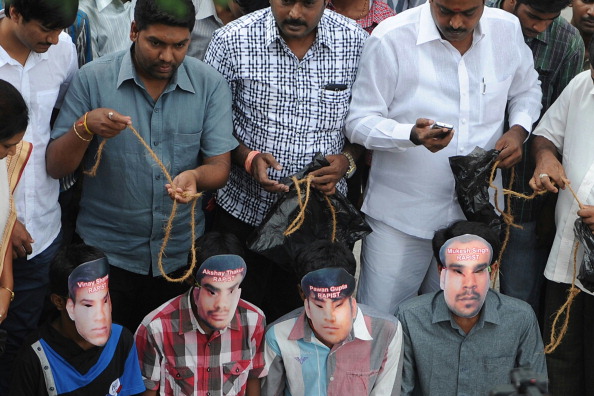
Women call for the death penalty for the four men convicted of rape and murder today in New Delhi, India (Photo Credit: Ajay Aggarwal/Hindustan Times via Getty Images).
By Tara Rao, Director of Amnesty International India
Today, a New Delhi court found four Indian men guilty of a December 2012 gang-rape and murder and sentenced them to death. A 17-year old convicted in the same case was sentenced to three years detention in a juvenile home on August 31. Another accused was found dead in his prison cell in March.
The rape and murder of the young woman in Delhi last year was a horrific crime and our deepest sympathy goes out to the victim’s family. Those responsible must be punished, but the death penalty is never the answer.
Far-reaching procedural and institutional reform, and not the death penalty, is needed to tackle the endemic problem of violence against women in India.
Sending these four men to the gallows will accomplish nothing except short-term revenge. While the widespread anger over this case is understandable, authorities must avoid using the death penalty as a ‘quick-fix’ solution. There is no evidence that the death penalty is a particular deterrent to crime, and its use will not eradicate violence against women in India.
Cases of rape and other forms of sexual violence against women are still common throughout India. In April, the government passed new laws which criminalized several forms of violence against women including acid attacks, stalking and voyeurism. However, rape within marriage is still not considered a crime under law if the wife is over 15, and security forces continue to enjoy effective legal immunity for sexual violence.

Youths, wearing masks of the four convicted rapists, enact a mock execution following the sentencing in New Delhi of four men convicted of rape and murder (Photo Credit: Manjunath Kiran/AFP/Getty Images).
Addressing this issue requires legal reform, but also sustained commitment by the authorities to ensure that the justice system responds effectively at all levels to reports of rape and other forms of sexual violence.
The attention that authorities have given to this case must extend to the thousands of other pending cases of sexual violence in India as well. Authorities must take steps – including appointing more judges – to ensure swift, but fair trials in all these cases.
Crimes against women are still under-reported. Authorities have yet to fully implement several progressive recommendations made by the Justice Verma Committee, including around police training and reform, and changing how reports of sexual violence are registered and investigated.
There must be concerted efforts to change the discriminatory attitudes towards women and girls which lie at the root of the violence. These measures will take hard work, but will be more effective in the long run in making India safer for women.
Amnesty International opposes the death penalty in all cases without exception, regardless of the nature or circumstances of the crime; guilt, innocence or other characteristics of the individual; or the method used by the state to carry out the execution.
In India, in matters of bail offence of rape (sec: 376 IPC) is treated at par with henious offence like murder (302 IPC). Court attitude is stern. Most of the accused belongs to crude and macho segments of the society.
This is one of rarest of the rare cases: gang rape accompanied with brutal murder. The victim was bludgeoned andIrön rod was inserted in the private part of the deceased among others. In India death sentence is awarded in cases categorised as rarest of the rare. Approx 35K murders take place each year in India. Number of death sentences carried out during a decade, you can count on your fingers. True that existing laws on henious crimes are no less stringent but that fails to cut ice with given segments of the society to which most of the offenders belong. One of the reasons may be high rate of acquitals. And you can't blame the courts for this.
Death sentence may definitely be not an answer or response to the gruesome crimes committed. Instead, hardcore criminals must be sentenced to longer prison terms without parole and when a person is a threat to society, they should be imprisoned for life without parole. Justice system in India lacks credibility for being inconsistent with many loopholes. Political prisoners are subjected to basic human rights abuse often. In many cases, justice system was not equal for all citizens. India is among world's largest democratic countries but lags behind in being equal for all it's citizens.
This paper discusses at length the effect of modernization on the rural women. It states that the declining status of the rural woman is not because of technology alone. It is the result of a combination of forces in the form of literacy, caste and class barrier, low self-perception of women and the lackadaisical attitude of the Govt. towards women's issues.
Nice